Overview
This article shines a light on engaging activities designed to enhance social skills in autistic children. It emphasizes the importance of nurturing environments and highlights various methods—such as interactive storytelling, sensory play, team-based sports, and mindfulness practices—that can make a significant difference. These approaches collectively foster communication, cooperation, and emotional regulation, supporting the development of essential interpersonal skills.
As parents, understanding these methods can be a game-changer. Imagine your child participating in interactive storytelling, where they not only engage their imagination but also practice sharing and taking turns. Or picture them in a team-based sport, learning the value of cooperation while having fun with peers.
Mindfulness practices also play a crucial role. They help children learn to manage their emotions, providing them with tools to navigate social situations more effectively. By incorporating these activities into your child's routine, you're not just enhancing their skills; you're creating a supportive space for them to thrive.
We encourage you to explore these methods further and consider how they might fit into your family's life. Share your experiences or thoughts in the comments—we’d love to hear from you! Together, we can foster a community that supports the growth and development of our children.
Introduction
In a world that is becoming increasingly aware of the diverse needs of children with autism, innovative approaches to fostering social skills and emotional development are stepping into the spotlight. Imagine the joy and growth that can come from interactive storytelling, sensory play, team sports, and community service projects—each a vibrant opportunity for autistic children to thrive and connect with others. These engaging activities not only empower children but also enhance their social interactions, creating a nurturing environment for collaboration and creativity.
As parents and professionals seek effective strategies to support children on the autism spectrum, it’s essential to recognize the value of these initiatives. They serve as vital tools for improving communication and building lasting connections. By exploring these dynamic methods, we can reveal pathways toward enriching the experiences of our children and nurturing their incredible potential. Together, let’s embrace these opportunities and support our children in their journey toward social and emotional growth.
About ASD Media: Empowering Parents with Resources for Autism Support
At ASD Media, we are dedicated to advancing the implementation of ABA therapy by providing valuable insights and strategies that tackle challenges and enhance outcomes. Our organization offers a comprehensive array of resources specifically designed for parents and professionals, including:
- Activities for autistic kids
- Cultivating a supportive and inclusive community where experiences can be shared
- Learning is encouraged
By subscribing to our newsletter, individuals gain access to the latest updates and an abundance of digital resources aimed at supporting them on their journey.
Our mission is to unlock the potential of youth with autism and ADHD through effective strategies that manage challenging behaviors, navigate support services, and foster interpersonal development. Recent statistics reveal that for individuals aged 6 and above, ongoing engagement in ABA therapy plays a significant role in skill development, social integration, and independence. Notably, 46% of youngsters who continue therapy for 24 months show marked improvement in these essential areas. Additionally, case studies underscore the effectiveness of therapeutic interventions, such as cognitive behavioral therapy (CBT), when tailored to meet the unique needs of autistic individuals.
Regular education and training of therapists are vital to ensure that these individuals receive the necessary support to enhance their quality of life, and engaging in activities for autistic kids, such as those offered by ASD Media's in-home autism care programs, has a profound impact on both parents and professionals in the ABA therapy sector, highlighting the importance of community support in achieving positive outcomes for autistic youth.
By offering expert opinions and resources, ASD Media plays a crucial role in enhancing the overall effectiveness of autism support services. We invite you to connect with us, share your experiences, and become part of a community that is committed to making a difference.
Interactive Storytelling: Enhancing Communication Through Imaginative Play
Interactive storytelling offers a wonderful opportunity for young individuals to immerse themselves in the creative process of narrative-building, allowing them to express their thoughts and emotions in a supportive environment. This engaging exercise can be particularly enriching in group settings, where participants take turns contributing to a story, often enhanced by props or illustrations. Through this collaborative storytelling, children not only learn to listen and respond, but they also cultivate the ability to expand on one another's ideas—essential skills for effective communication and interpersonal interaction.
Recent research highlights the positive outcomes of storytelling workshops centered on cooperative narrative creation. Participants have reported improved leadership abilities, showcasing the significant impact these engagements can have on social development. Furthermore, case studies, such as those from Better Speech, emphasize the effectiveness of tailored online speech therapy services that incorporate storytelling methods. These approaches have led to remarkable advancements in communication skills through various activities for autistic kids.
These storytelling activities not only nurture creativity but also foster lasting memories and connections among participants. One participant shared, "It was fun meeting new people. It was hard at first, but once we got started, it became easier and easier." This sentiment beautifully illustrates how storytelling can enhance social interactions in a nurturing setting, ultimately supporting the growth of social skills through various activities for autistic kids. We encourage parents to explore activities for autistic kids, as these can make a meaningful difference in their social development.
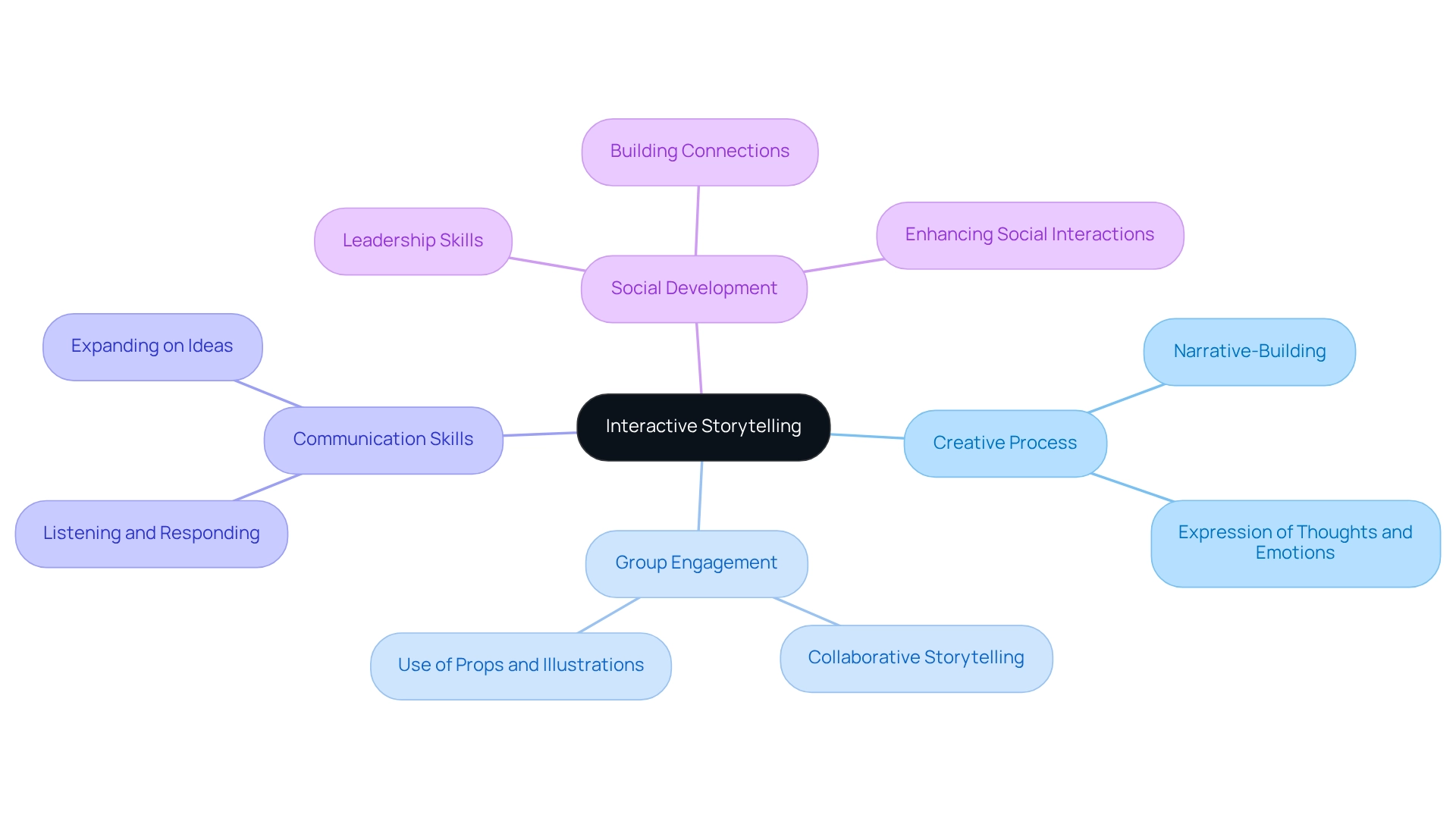
Sensory Play Stations: Fostering Interaction and Exploration in a Safe Environment
Creating sensory play areas filled with materials like sand, water, and textured items invites young children to engage with their surroundings in meaningful ways. These play stations can be thoughtfully designed to foster cooperative play, allowing children to collaborate on activities for autistic kids such as building, creating, or problem-solving.
Research shows that sensory play is crucial for emotional regulation and enhances communication skills, as children express their experiences and discoveries with their peers. Experts highlight that sensory toys serve as a bridge for children of all neurotypes, fostering connections and understanding. Dr. Starke notes, "Sensory toys can establish a shared space for youngsters of all neurotypes to connect and comprehend one another."
By incorporating activities for autistic kids into daily routines, parents can significantly enrich their children’s social interactions and overall development. This approach not only nurtures comprehensive growth for infants and young children but also aligns with the broader benefits of play-centered education during their learning journeys.
Furthermore, studies reveal that children with ADHD showed enhanced cognitive performance through the use of sensory toys, underscoring the importance of these engaging activities for autistic kids. The case study titled 'Incorporating Sensory Play into Daily Life' illustrates how sensory play can be seamlessly integrated into everyday routines with common household items, making playtime not only more engaging but also beneficial.
Team-Based Sports: Building Cooperation and Social Bonds Among Peers
Engaging in team-oriented sports like soccer and basketball offers young people a wonderful opportunity to cultivate essential skills in collaboration and teamwork. These activities naturally encourage communication, strategic thinking, and mutual support—crucial elements for building meaningful interpersonal connections. Coaches play an invaluable role in this journey, facilitating interactions and inspiring youth to work together towards shared goals.
Research highlights that structured environments, such as those found in team sports, significantly enhance learning and foster improved interpersonal relationships. Moreover, studies reveal that young individuals involved in group sports not only develop vital life skills but also maintain friendships formed during these activities, which can yield personal and professional benefits in the long run. As noted in the Journal of Sport & Exercise Psychology, "Former athletes often maintain their athletic networks throughout their lives, which can be valuable for personal and professional opportunities."
Furthermore, effective sports programs tailored for autistic youth have shown remarkable improvements in interpersonal skills, underscoring the profound impact these experiences can have on their development. Data suggests that participation in team sports can lead to increased community engagement and collaboration among peers, further emphasizing the importance of these activities in nurturing interpersonal abilities.
In what ways have you seen sports shape your child's friendships or teamwork skills? We encourage you to share your experiences and thoughts, as they can inspire others in our community.
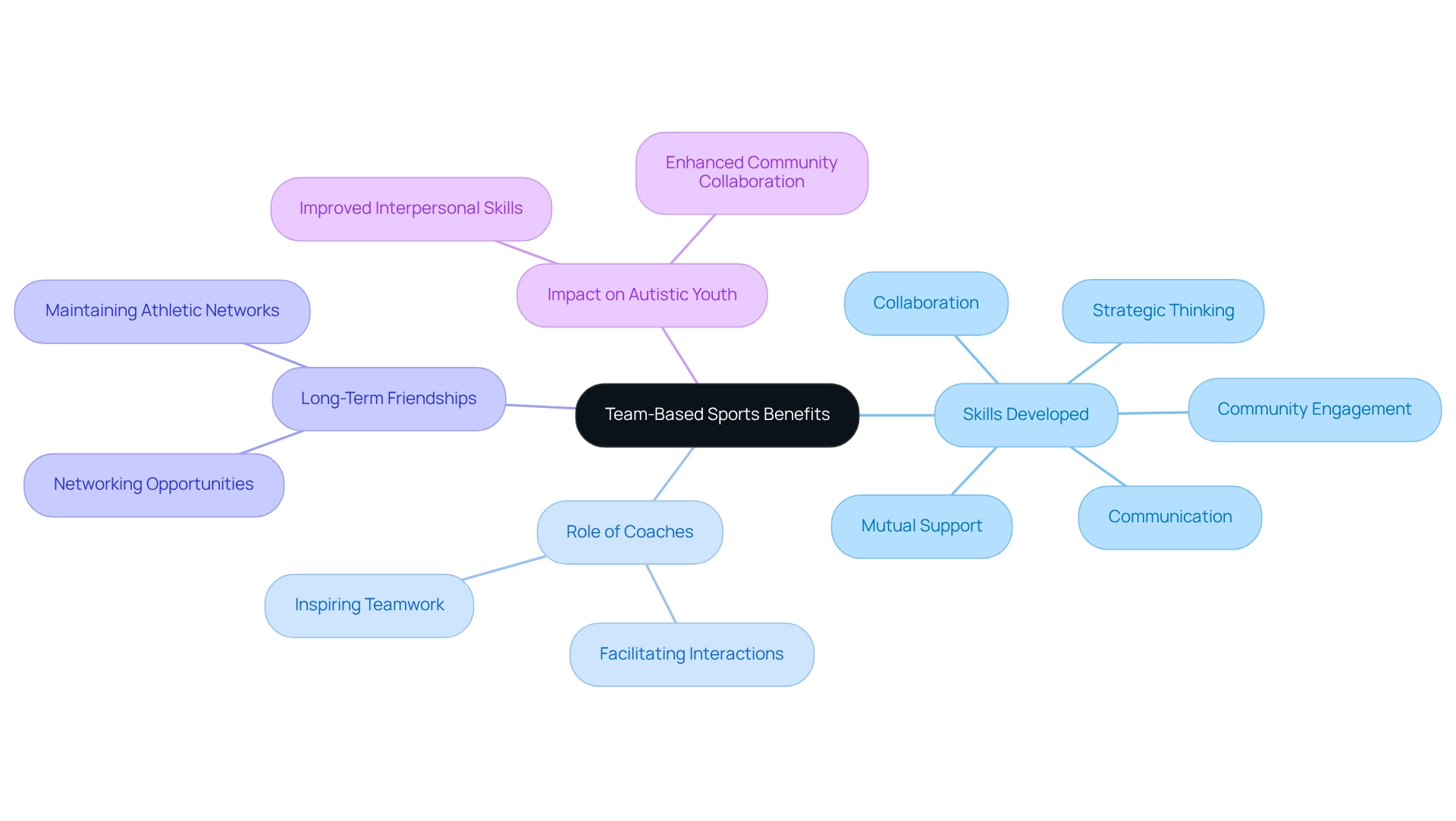
Art Collaboration Projects: Encouraging Teamwork and Creative Expression
Art collaboration projects, such as creating a mural or a collective sculpture, serve as wonderful opportunities for fostering teamwork and creative expression among young individuals. These initiatives invite participation from everyone involved, nurturing a sense of ownership and collective responsibility. As children engage in activities for autistic kids, they naturally cultivate vital interpersonal skills, including sharing, discussing, and compromising.
Research highlights the significant benefits of group art therapy, particularly through these activities for autistic kids, in enhancing trust and interpersonal skills among adolescents with autism spectrum disorder (ASD). For instance, the 'Collector's Club' illustrates how shared hobbies can effectively improve interactions, leading to greater communication and cooperation among individuals with high-functioning ASD. Furthermore, insights from professionals underscore the therapeutic advantages of art in conflict resolution, emphasizing that involvement in group art activities not only fosters collaboration but also bolsters communication abilities.
This aligns beautifully with the idea that embracing diverse perspectives is essential in collaborative projects, enriching the creative process and encouraging unique contributions. Overall, these projects not only ignite creativity but also play a vital role in nurturing essential interpersonal skills within a supportive environment. We encourage you to explore these collaborative art initiatives as activities for autistic kids and consider how they might benefit your child’s development and social connections.
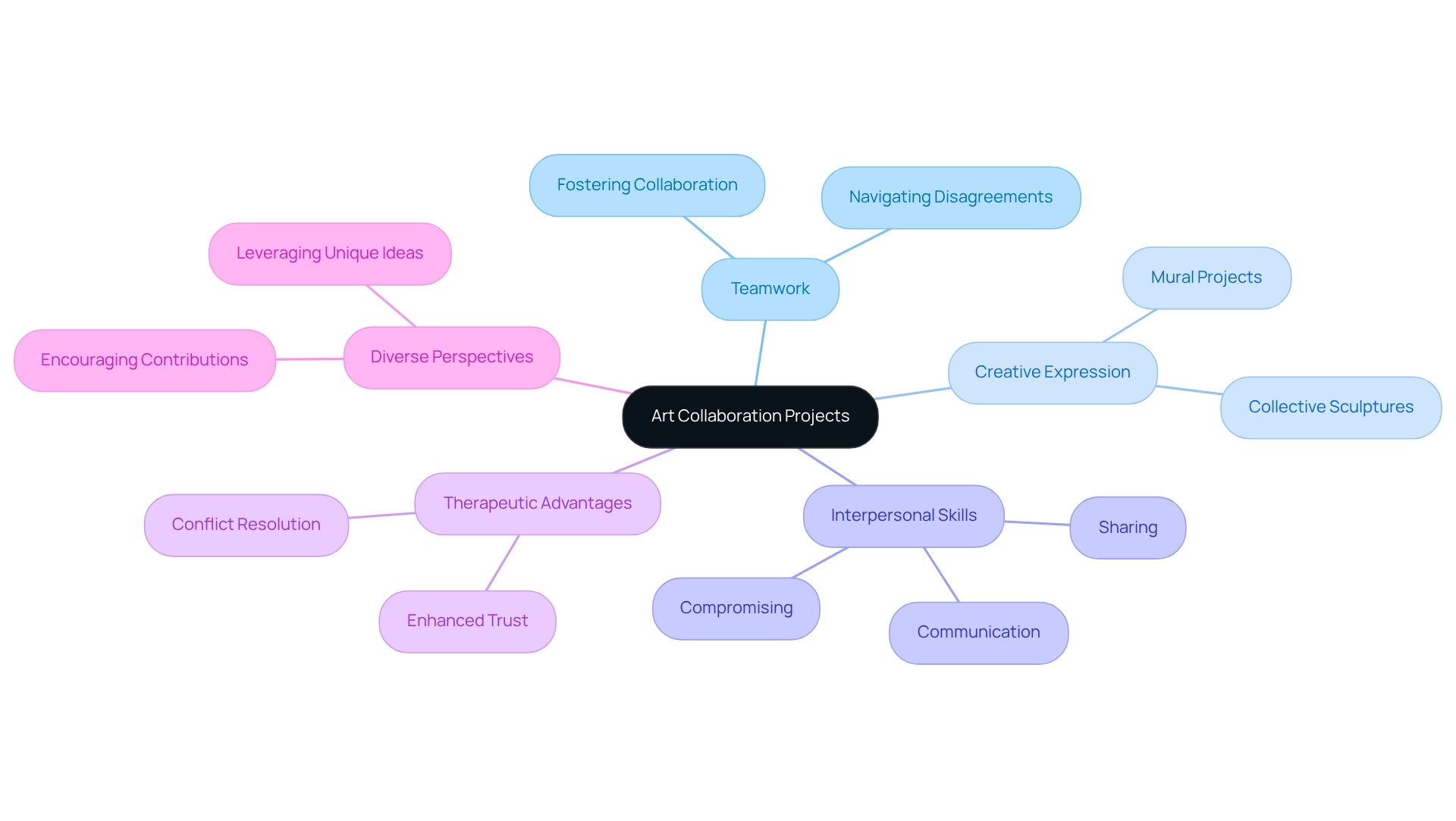
Cooking Classes: Teaching Teamwork and Communication Through Culinary Arts
Culinary courses offer a delightful and effective way for young people to acquire essential life skills while enhancing their ability to connect with others. Through the collaborative preparation of recipes, children engage in vital practices such as following instructions, sharing responsibilities, and communicating clearly. These classes can be designed to include discussions on nutrition and healthy eating, enriching the educational experience and fostering interaction.
For instance, a recent event at Shrub Oak International School showcased a practical baking lesson that not only imparted culinary knowledge but also highlighted the importance of collaboration and cultural traditions. Participants, including students and staff, expressed a strong sense of community and reported significant development in practical abilities, underscoring the program's success in enhancing interpersonal skills through culinary arts. As Chisa Merriweather, a graphic designer involved in the program, shared, "We want to acknowledge the participants, teachers, volunteers, and staff who made this program possible."
Statistics reveal that 90% of participants had a positive impression of their learning experience in similar cooking programs, demonstrating the effectiveness of these activities for autistic kids in fostering teamwork and communication. By engaging in activities for autistic kids, young individuals not only learn to cook but also cultivate essential interpersonal skills that will serve them well in various aspects of life.
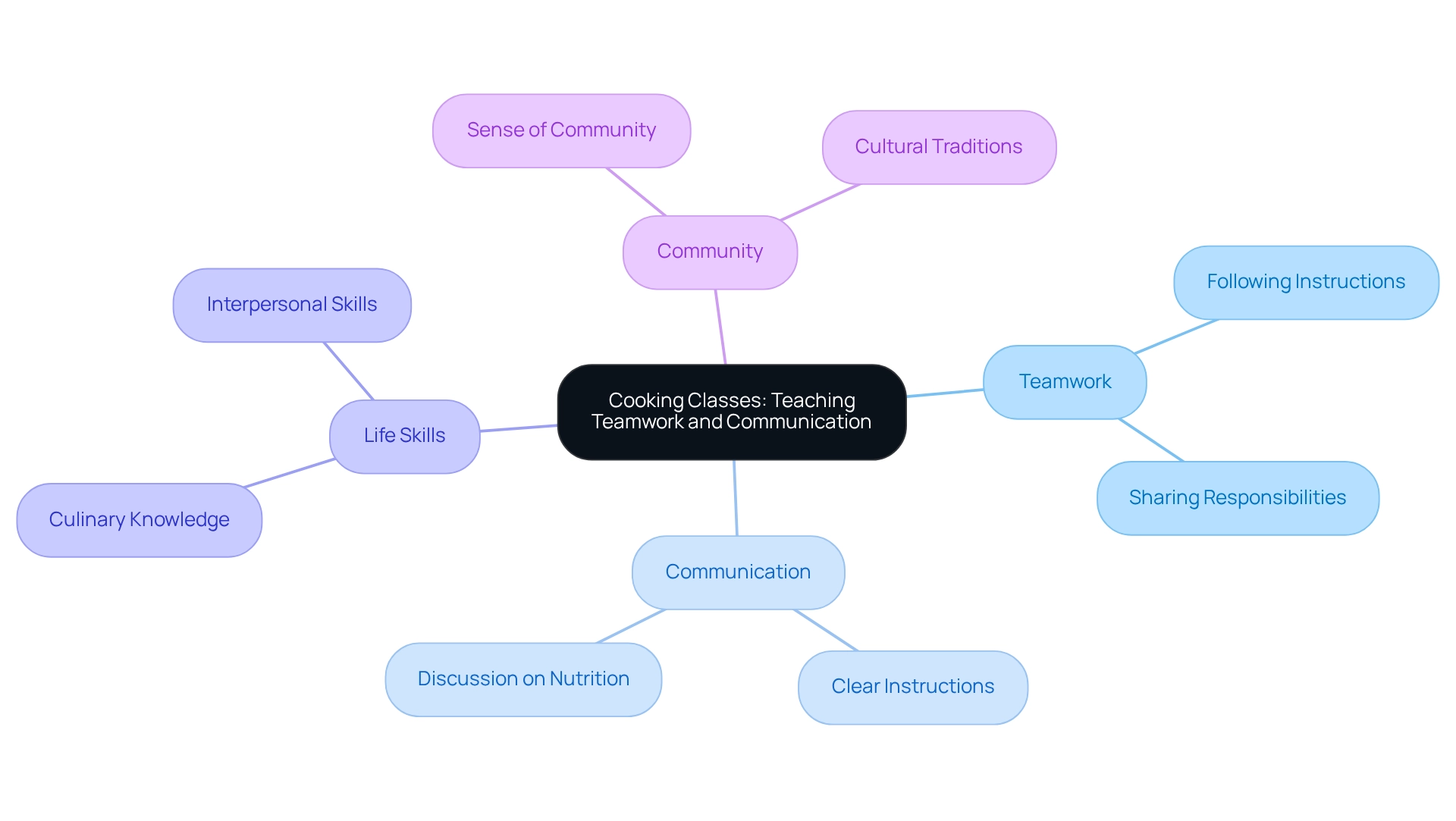
Role-Playing Games: Practicing Social Scenarios in a Fun Setting
Role-playing games, such as Dungeons & Dragons, offer a wonderful opportunity for young people to engage in scenarios that reflect real-life situations. By stepping into the shoes of various characters and tackling diverse challenges, children can enhance essential skills like communication, negotiation, and problem-solving. This interactive approach not only encourages critical thinking about interpersonal relationships but also fosters empathy, making it an invaluable tool for developing social skills.
Structured role-playing strategies in ABA therapy—like identifying specific areas for growth, crafting relevant scenarios, assigning roles, and providing feedback—can significantly enhance the effectiveness of these games. Research indicates that these organized activities improve young people's understanding of social cues and their ability to connect with peers. Moreover, educators highlight the profound impact of activities for autistic kids, noting that they create a safe space for nurturing social skills, leading to positive outcomes in interactions for autistic youth. As Ursula K. Le Guin beautifully expressed, "The imagination is an essential tool of the mind, a fundamental way of thinking, an indispensable means of becoming and remaining human." This underscores the vital role that creativity plays in enhancing interpersonal skills through activities for autistic kids, including role-playing.
Have you seen how your child engages with role-playing games? Sharing your experiences can inspire others and foster a supportive community. Let's explore how we can further support our children in developing these important skills together.
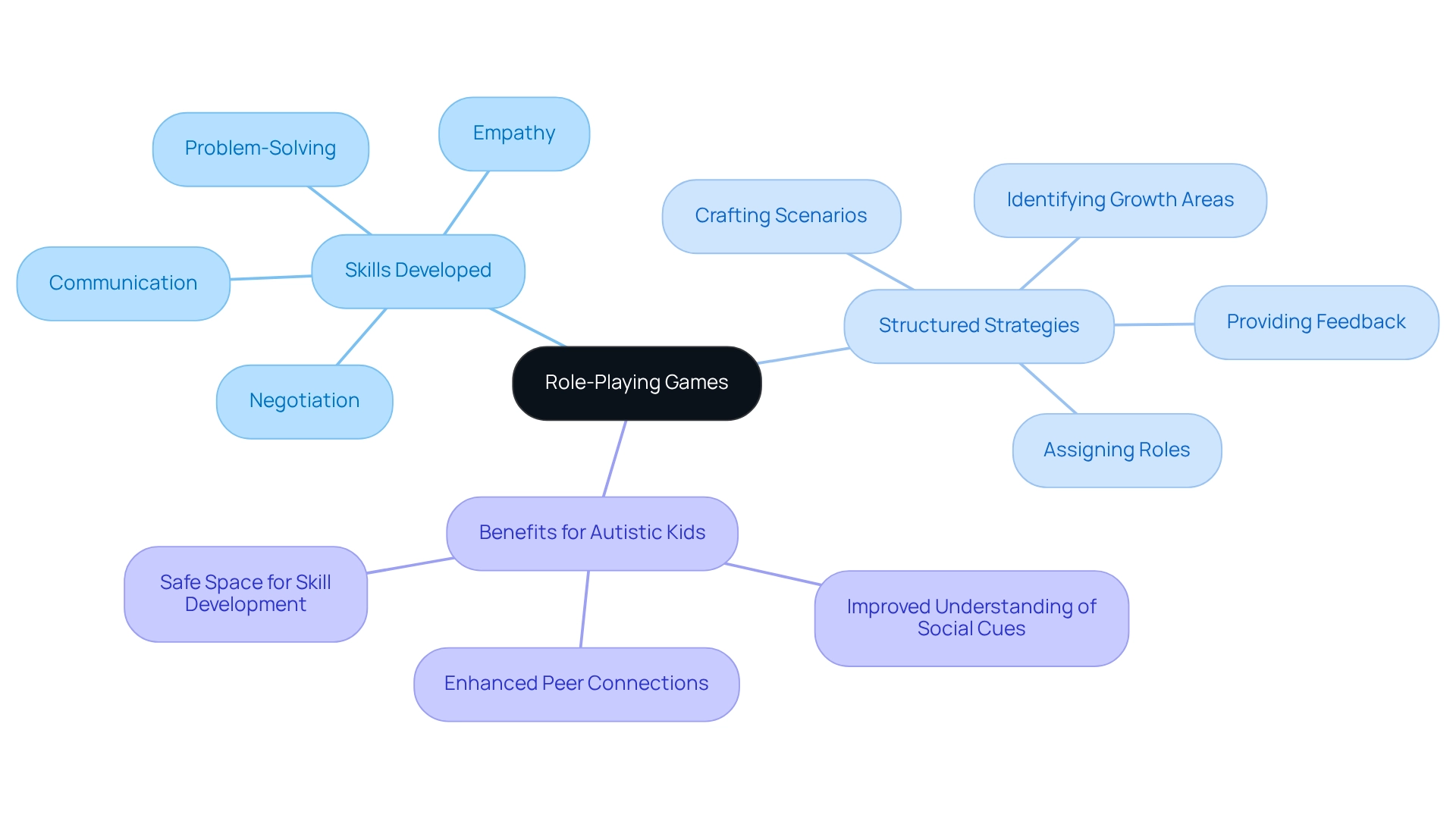
Mindfulness and Yoga: Promoting Relaxation and Social Interaction
Mindfulness and yoga sessions can be thoughtfully tailored for young individuals, promoting relaxation and enhancing social interaction. By incorporating exercises such as guided breathing techniques, group yoga poses, and mindfulness games, we can motivate youngsters to connect with their bodies and emotions.
Research shows that mindfulness-based interventions (MBIs) consistently yield small positive effects on peer relationships, underscoring the effectiveness of these practices. Notably, 40% of home-based programs reported significant improvements in aggressive behavior, highlighting the broader impact of mindfulness and yoga on behavior management—a key concern for parents of children with autism, who are often looking for activities for autistic kids that not only alleviate anxiety but also cultivate a calm atmosphere where young individuals feel safe to express themselves and engage more effectively with their peers.
Furthermore, relaxation methods have been linked to improved communication skills, empowering youngsters to navigate interpersonal situations with greater ease. As Shuang Lu points out, mindfulness practices can greatly enhance peer relationships. By integrating mindfulness and yoga into their routines, activities for autistic kids can help individuals with autism experience substantial benefits in developing their interpersonal skills.
Sensitivity analyses have confirmed the robustness of MBI results, demonstrating consistent small positive effects on peer interactions across various contexts. This reinforces the reliability of these findings, offering hope and encouragement for parents seeking effective strategies to support their children. Together, we can foster environments where our young ones thrive emotionally and socially.
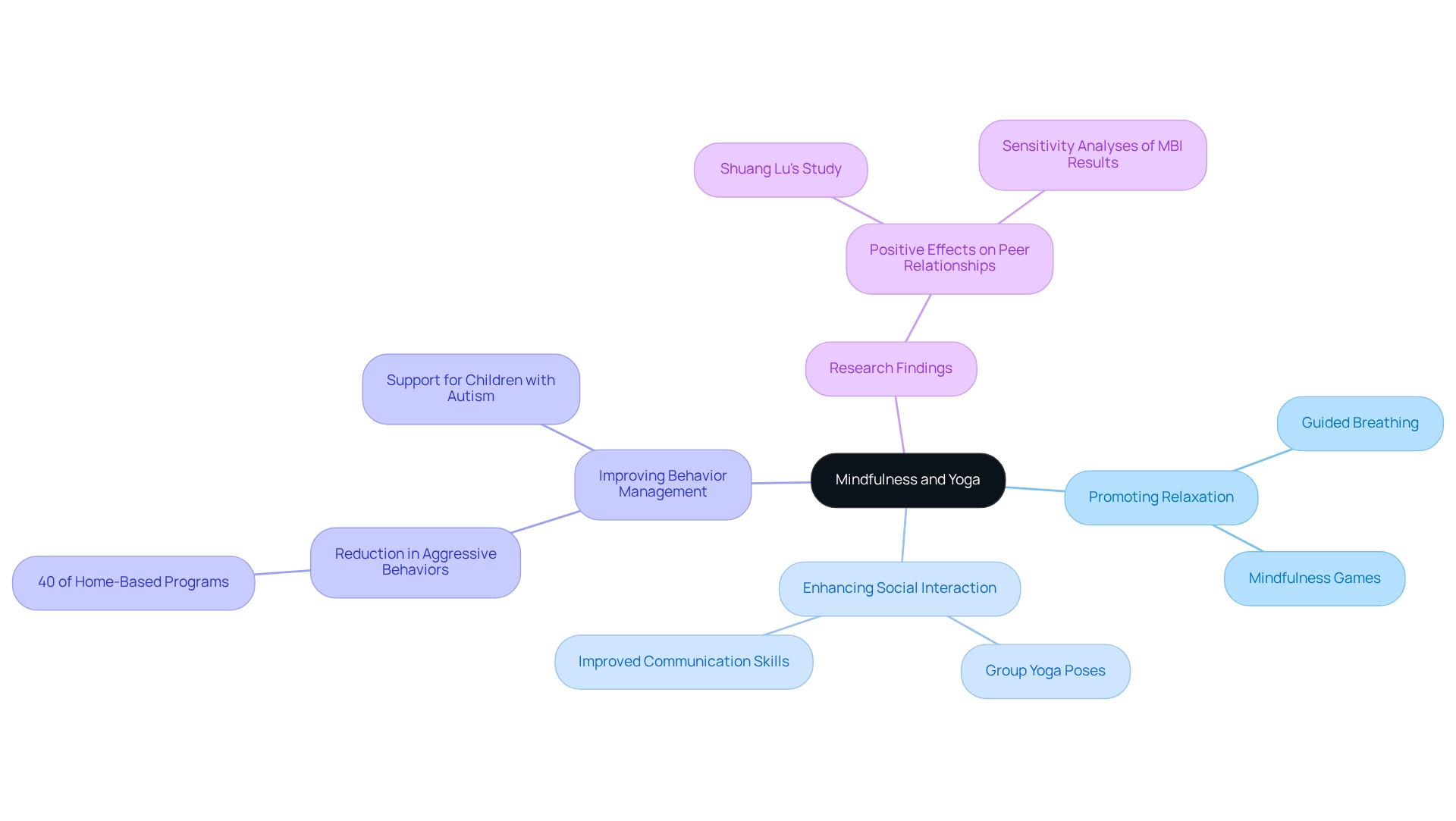
Community Service Projects: Strengthening Social Skills Through Giving Back
Engaging in community service projects, like volunteering at local shelters or participating in environmental clean-ups, offers young individuals a wonderful opportunity to unite around shared goals. These meaningful activities not only foster teamwork and communication but also cultivate a profound sense of community responsibility. By interacting with diverse groups, young people can enhance their interpersonal skills in authentic environments, significantly improving their ability to connect with others.
Research indicates that community service initiatives can lead to lasting positive effects on the development of social skills. Studies reveal that children involved in such projects demonstrate improved teamwork and communication abilities. For example, a review of corporate volunteering programs showcases the benefits for both individuals and organizations, suggesting that these experiences provide significant advantages for volunteers and the communities they support.
Moreover, insights from professionals underscore the critical role of service learning in developing essential interpersonal skills and cross-cultural competencies. Custer C. Deocaris, a research specialist, emphasizes, 'Our study highlights the importance of service learning programs in higher education for enhancing interpersonal abilities and cross-cultural competencies among students in highly technical fields.' This highlights the vital role of community engagement for youth, including those with autism, by incorporating activities for autistic kids. Ultimately, community service initiatives serve as a powerful avenue for interpersonal development, offering invaluable experiences that contribute to personal growth and strengthen community ties. We encourage you to explore local opportunities for your children to get involved, fostering not just their skills but also a lifelong commitment to service.
Virtual Social Skills Workshops: Connecting Autistic Kids in a Digital Space
Virtual interactive workshops create a nurturing environment for young individuals to engage and gain knowledge in a safe online space. These workshops typically incorporate interactive activities, discussions, and role-playing scenarios that focus on enhancing interpersonal abilities. Through active engagement, youngsters not only develop their communication skills but also forge new friendships, all while acquiring essential social techniques applicable in everyday situations.
Remarkably, studies reveal that emotional skills development in these settings can yield a Standardized Mean Difference (SMD) of 2.45, with a 95% Confidence Interval (CI) of 0.21–4.18 and a p-value of 0.03. This underscores the effectiveness of online training in enhancing communication.
Moreover, the accessibility of online platforms fosters connections among autistic children, enabling them to participate in various activities for autistic kids and interact with peers they may not otherwise encounter. As the demand for such programs continues to rise, it is increasingly vital to highlight the need for more rigorous research into their long-term benefits, especially in light of the current educational landscape that prioritizes innovative teaching methods.
As Nigel Newbutt poignantly states, "based on our preliminary study, this chapter will conclude with how we think HMDs and VRTs might be used in the future to help enable ASD populations address some of the challenges faced on a daily basis.
Conclusion
Engaging children with autism in interactive and supportive activities is essential for fostering their social skills and emotional development. From interactive storytelling and sensory play to team sports and community service projects, each approach offers unique benefits that encourage communication, collaboration, and creativity. These initiatives not only empower children but also create a nurturing environment where they can thrive and connect with their peers.
The evidence supporting these methods is compelling. Research consistently shows that structured activities, whether in a physical or virtual setting, lead to significant improvements in social interactions, emotional regulation, and teamwork. Programs like cooking classes and art collaborations not only teach essential life skills but also foster a sense of belonging and community among participants. Furthermore, mindfulness practices and role-playing games provide safe spaces for children to explore social scenarios and manage their emotions, enhancing their overall well-being.
As our understanding of autism continues to evolve, embracing these innovative strategies becomes increasingly vital. By investing in diverse activities that cater to the unique needs of autistic children, parents, educators, and communities can collectively enhance their social experiences and help unlock their incredible potential. The journey toward social and emotional growth is one that can be enriched by collaboration, creativity, and compassion, paving the way for a brighter future for all children on the autism spectrum.
Frequently Asked Questions
What is the mission of ASD Media?
ASD Media's mission is to unlock the potential of youth with autism and ADHD through effective strategies that manage challenging behaviors, navigate support services, and foster interpersonal development.
What resources does ASD Media provide for parents and professionals?
ASD Media offers a comprehensive array of resources, including activities for autistic kids, community support for sharing experiences, and encouragement for learning.
How does ABA therapy impact skill development for individuals aged 6 and above?
Ongoing engagement in ABA therapy plays a significant role in skill development, social integration, and independence, with 46% of youngsters who continue therapy for 24 months showing marked improvement in these areas.
Why is regular education and training of therapists important?
Regular education and training of therapists are vital to ensure that individuals receive the necessary support to enhance their quality of life and achieve positive outcomes in ABA therapy.
What is the significance of interactive storytelling for young individuals?
Interactive storytelling allows young individuals to engage in narrative-building, express thoughts and emotions, and develop communication and interpersonal skills, especially in group settings.
How do storytelling workshops benefit participants?
Storytelling workshops centered on cooperative narrative creation have been shown to improve leadership abilities and enhance social development among participants.
What role does sensory play have in the development of children?
Sensory play is crucial for emotional regulation and enhances communication skills, as it allows children to express their experiences and fosters connections among peers.
How can parents incorporate activities for autistic kids into daily routines?
Parents can significantly enrich their children’s social interactions and overall development by incorporating activities for autistic kids, such as sensory play, into their daily routines.
What evidence supports the effectiveness of sensory toys for children with ADHD?
Studies reveal that children with ADHD showed enhanced cognitive performance through the use of sensory toys, highlighting their importance in engaging activities for autistic kids.




